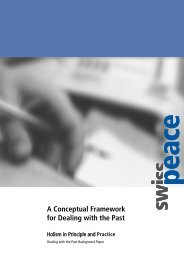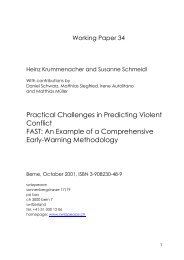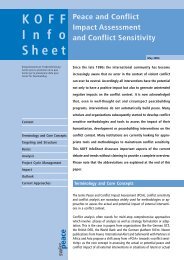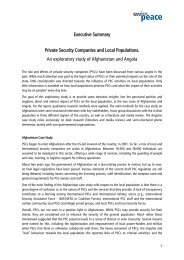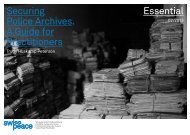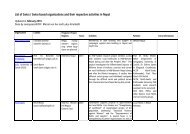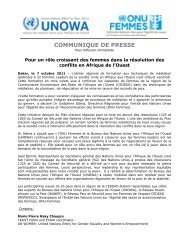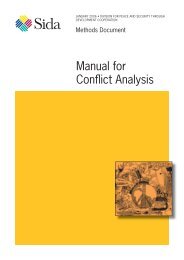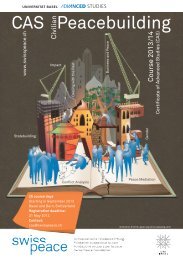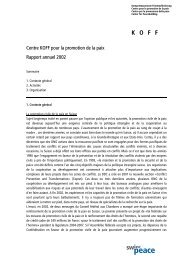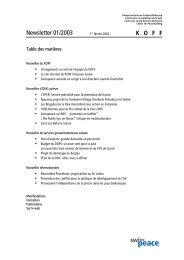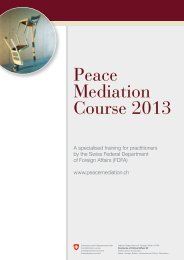Unpacking the Mystery of Mediation in African Peace ... - Swisspeace
Unpacking the Mystery of Mediation in African Peace ... - Swisspeace
Unpacking the Mystery of Mediation in African Peace ... - Swisspeace
Create successful ePaper yourself
Turn your PDF publications into a flip-book with our unique Google optimized e-Paper software.
<strong>Unpack<strong>in</strong>g</strong> <strong>the</strong> <strong>Mystery</strong> <strong>of</strong> <strong>Mediation</strong> <strong>in</strong> <strong>African</strong> <strong>Peace</strong> Processes<br />
structural factors: first, <strong>African</strong> leaders had promoted<br />
<strong>the</strong> idea “<strong>African</strong> solutions for <strong>African</strong><br />
problems”, and wanted to establish <strong>the</strong> newlyfounded<br />
AU as an effective conflict manager <strong>in</strong><br />
Africa. Darfur was an opportunity for <strong>the</strong> AU to<br />
match rhetoric with action. Second, <strong>the</strong> most important<br />
concern <strong>of</strong> <strong>the</strong> GoS was to prevent Western<br />
powers from <strong>in</strong>terfer<strong>in</strong>g <strong>in</strong> <strong>the</strong> Darfur conflict,<br />
which <strong>the</strong> GoS feared would happen if <strong>the</strong><br />
UN got <strong>in</strong>volved. The AU was <strong>the</strong> least bad alternative<br />
and <strong>the</strong>refore acceptable for <strong>the</strong> GoS as<br />
a mediator.<br />
Negotiations<br />
<strong>Mediation</strong> Style and Strategy<br />
The mediation process was led by AU Special<br />
Envoy Salim Ahmed Salim, a former Tanzanian<br />
foreign m<strong>in</strong>ister. He was supported by a mediation<br />
team led by Ambassador Sam Ibok that consisted<br />
<strong>of</strong> different topical experts, some <strong>of</strong> <strong>the</strong>m<br />
seconded by Western governments. The Swiss<br />
Federal Department <strong>of</strong> Foreign Affairs (FDFA),<br />
for example, seconded a power-shar<strong>in</strong>g expert until<br />
January 2006 when a decision was taken to opt<br />
out <strong>of</strong> <strong>the</strong> process. The first rounds were cochaired<br />
by <strong>the</strong> AU and <strong>the</strong> Chadian government,<br />
but <strong>in</strong> <strong>the</strong> light <strong>of</strong> deteriorat<strong>in</strong>g relations between<br />
Chad and Sudan, <strong>the</strong> AU became <strong>the</strong> sole mediator<br />
<strong>in</strong> <strong>the</strong> 7th round <strong>of</strong> <strong>the</strong> talks. The negotiations<br />
took place <strong>in</strong> <strong>the</strong> Sheraton and <strong>the</strong>n <strong>the</strong> Chida<br />
Hotel <strong>in</strong> Abuja, which is also where <strong>the</strong> delegations<br />
resided, without be<strong>in</strong>g physically separated<br />
from each o<strong>the</strong>r – a po<strong>in</strong>t <strong>of</strong> stress for <strong>the</strong> parties.<br />
At <strong>the</strong> outset, <strong>the</strong> style and strategy <strong>of</strong> <strong>the</strong> mediators<br />
<strong>in</strong> Abuja resembled <strong>the</strong> negotiations between<br />
North and South Sudan <strong>in</strong> Kenya that produced<br />
<strong>the</strong> Comprehensive <strong>Peace</strong> Agreement (CPA) <strong>in</strong><br />
January 2005: <strong>the</strong> mediation was led by a respected<br />
<strong>African</strong> statesman, who represented a regional<br />
organization, was backed by <strong>the</strong> <strong>in</strong>ternational<br />
community, and was supported by a team<br />
<strong>of</strong> experts. The idea was for <strong>the</strong> mediator to be<br />
proactive <strong>in</strong> terms <strong>of</strong> guid<strong>in</strong>g <strong>the</strong> process and<br />
draft<strong>in</strong>g agreements, but to leave <strong>the</strong> negotiat<strong>in</strong>g<br />
to <strong>the</strong> parties. In o<strong>the</strong>r words, <strong>the</strong> mediators <strong>in</strong><br />
Abuja <strong>in</strong>itially acted as “formulators”. Ano<strong>the</strong>r<br />
strategy from <strong>the</strong> CPA negotiations was to get <strong>the</strong><br />
parties to agree to a series <strong>of</strong> broad pr<strong>in</strong>ciples be-<br />
80<br />
fore tackl<strong>in</strong>g <strong>the</strong> nitty-gritty <strong>of</strong> a comprehensive<br />
peace agreement. 215 Thus, <strong>in</strong> July 2005, <strong>the</strong> parties<br />
adopted a Declaration <strong>of</strong> Pr<strong>in</strong>ciples (DoP).<br />
After <strong>the</strong> adoption <strong>of</strong> <strong>the</strong> DoP, a range <strong>of</strong> external<br />
developments changed <strong>the</strong> context <strong>of</strong> <strong>the</strong> Abuja<br />
talks: first, <strong>the</strong> SLM/A split <strong>in</strong>to two factions; second,<br />
<strong>the</strong> longstand<strong>in</strong>g alliance between Chad and<br />
Sudan collapsed and a proxy conflict between <strong>the</strong><br />
two governments began to take shape; third, <strong>the</strong><br />
death <strong>of</strong> John Garang meant that <strong>the</strong> Sudan People’s<br />
Liberation Movement/Army (SPLM/A) was<br />
preoccupied with itself and as a result, largely disengaged<br />
from <strong>the</strong> Darfur peace process; fourth,<br />
<strong>the</strong> NCP’s perspective on Darfur shifted from<br />
immediate security concerns to <strong>the</strong> elections <strong>of</strong><br />
2009, where Darfurians are an important constituency;<br />
and fifth, <strong>the</strong> <strong>in</strong>ternational community<br />
– <strong>in</strong>clud<strong>in</strong>g <strong>the</strong> f<strong>in</strong>ancial backers <strong>of</strong> <strong>the</strong> Abuja negotiations<br />
– grew impatient and expected <strong>the</strong><br />
talks to conclude before <strong>the</strong> end <strong>of</strong> 2005. Aga<strong>in</strong>st<br />
this background, <strong>the</strong> AU stepped up its pressure<br />
to reach a settlement. The mediation team divided<br />
<strong>the</strong> negotiations <strong>in</strong> three areas: powershar<strong>in</strong>g,<br />
wealth-shar<strong>in</strong>g, and security. In each<br />
committee, <strong>the</strong> AU mediators tried to work out<br />
protocols, which would later be merged <strong>in</strong>to a<br />
comprehensive agreement.<br />
However, <strong>the</strong>se efforts did not succeed, and <strong>the</strong><br />
patience <strong>of</strong> <strong>the</strong> <strong>in</strong>ternational community gradually<br />
ran out. In <strong>the</strong> beg<strong>in</strong>n<strong>in</strong>g <strong>of</strong> April 2006, <strong>the</strong><br />
political leadership <strong>of</strong> <strong>the</strong> AU determ<strong>in</strong>ed a deadl<strong>in</strong>e<br />
for <strong>the</strong> conclusion <strong>of</strong> <strong>the</strong> talks by <strong>the</strong> end <strong>of</strong><br />
<strong>the</strong> month. Thus, <strong>the</strong> mediators moved to draft a<br />
comprehensive peace agreement, based on previous<br />
discussions. The draft was presented to <strong>the</strong><br />
parties on 25 April, while its Arabic translation<br />
only arrived on 28 April. The deadl<strong>in</strong>e expired<br />
only two days later, which meant that <strong>the</strong>re was<br />
very little time for <strong>the</strong> parties to understand and<br />
discuss <strong>the</strong> 86-page draft, let alone to consult<br />
<strong>the</strong>ir constituents. There were also no direct negotiations<br />
between <strong>the</strong> parties about <strong>the</strong> content<br />
<strong>of</strong> <strong>the</strong> agreement. Thus, <strong>the</strong> crux <strong>of</strong> <strong>the</strong> problem<br />
was not so much that <strong>the</strong> draft agreement was<br />
written by <strong>the</strong> mediators, but ra<strong>the</strong>r that it was<br />
presented as a f<strong>in</strong>al document, ra<strong>the</strong>r than as<br />
215 Toga, Dawit: “The <strong>African</strong> Union <strong>Mediation</strong> and <strong>the</strong> Abuja<br />
Talks” <strong>in</strong>: de Waal, ed., War <strong>in</strong> Darfur and <strong>the</strong> Search for <strong>Peace</strong>,<br />
Cambridge, MA: Harvard University Press (2007).




